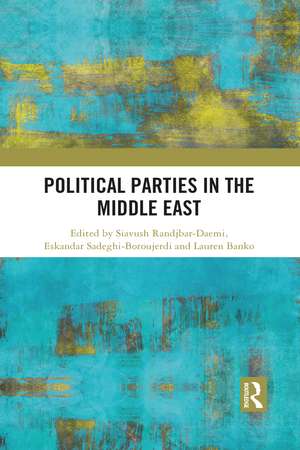Political Parties in the Middle East
Editat de Siavush Randjbar-Daemi, Eskandar Sadeghi-Boroujerdi, Lauren Bankoen Limba Engleză Paperback – 30 iun 2021
This book examines where political parties and organizations have been crucial to shaping contemporary historical events and political contestation, but also highlights their shortcomings and failures to deliver on the ambitions and hopes they had often evoked amongst their supporters. Furthermore, it looks at how political parties and their activities have intersected with important issues and themes such as gender, human rights, international solidarity, revolution and social transformation, and sectarian identity.
This book will be of great interest to students and researchers of political science, particularly within the MENA region. It was originally published as a special issue of the British Journal of Middle Eastern Studies.
Preț: 383.12 lei
Nou
Puncte Express: 575
Preț estimativ în valută:
73.31€ • 76.75$ • 60.66£
73.31€ • 76.75$ • 60.66£
Carte tipărită la comandă
Livrare economică 05-19 aprilie
Preluare comenzi: 021 569.72.76
Specificații
ISBN-13: 9781032090467
ISBN-10: 1032090464
Pagini: 176
Dimensiuni: 174 x 246 x 10 mm
Greutate: 0.3 kg
Ediția:1
Editura: Taylor & Francis
Colecția Routledge
Locul publicării:Oxford, United Kingdom
ISBN-10: 1032090464
Pagini: 176
Dimensiuni: 174 x 246 x 10 mm
Greutate: 0.3 kg
Ediția:1
Editura: Taylor & Francis
Colecția Routledge
Locul publicării:Oxford, United Kingdom
Public țintă
Postgraduate and UndergraduateCuprins
1. Introduction 2. Political parties in MENA: their functions and development 3. Protesting gender discrimination from within: women’s political representation on behalf of Islamic parties 4. ‘We wander in your footsteps’—reciprocity and contractility in Lebanese personality-centred parties 5. The party, the Gama’a and the Tanzim: the organizational dynamics of the Egyptian Muslim Brotherhood’s post-2011 failure 6. Party and governance in the Arab republics 7. The origins of Communist Unity: anti-colonialism and revolution in Iran’s tri-continental moment 8. Political Parties and Women’s Rights in Turkey 9. The historical emergence and transformation of the Moroccan political party field 10. The Popular Front for the Liberation of Palestine during the First Intifada: From Opportunity to Marginalization (1987–1990)
Notă biografică
Siavush Randjbar-Daemi is a Lecturer in Modern Middle Eastern History in the Faculty of History at the University of St Andrews, UK. His research interests lie in the evolution of the state in modern and contemporary Iran, and the contribution to the public sphere—particularly in periods of relative pluralism, such as the early 1950s or 1979–1981—of a variety of actors, from crowds formed by subaltern parts of society to socio-political elites.
Eskandar Sadeghi-Boroujerdi is a Lecturer in Comparative Political Theory at Goldsmiths, University of London, UK. He was previously a British Academy Postdoctoral Research Fellow at the University of Oxford, UK, and received his DPhil in Middle Eastern Studies at Queen's College, University of Oxford. He is the author of Revolution and Its Discontents: Political Thought and Reform in Iran (2019).
Lauren Banko is a Lecturer in the Department of History at Yale University, USA, teaching courses related to the history of the modern Middle East and North Africa, as well as Palestine and Israel. Her current research is broadly focused on the impact of colonialism before and during the interwar period of the twentieth century in the Arab Middle East and in pre-1948 Palestine.
Eskandar Sadeghi-Boroujerdi is a Lecturer in Comparative Political Theory at Goldsmiths, University of London, UK. He was previously a British Academy Postdoctoral Research Fellow at the University of Oxford, UK, and received his DPhil in Middle Eastern Studies at Queen's College, University of Oxford. He is the author of Revolution and Its Discontents: Political Thought and Reform in Iran (2019).
Lauren Banko is a Lecturer in the Department of History at Yale University, USA, teaching courses related to the history of the modern Middle East and North Africa, as well as Palestine and Israel. Her current research is broadly focused on the impact of colonialism before and during the interwar period of the twentieth century in the Arab Middle East and in pre-1948 Palestine.
Descriere
This comprehensive collection addresses the important question of political parties in the Middle East and North Africa (MENA), including Iran, Turkey, Palestine, Egypt, Lebanon, and Morocco. It was originally published as a special issue of the British Journal of Middle Eastern Studies.
